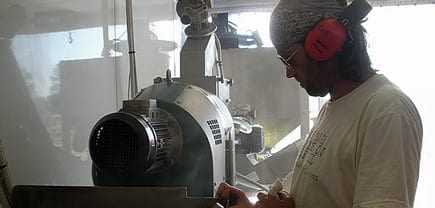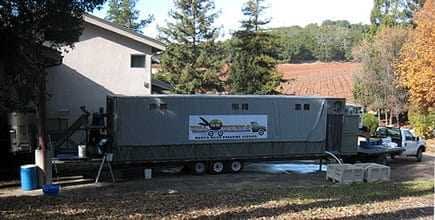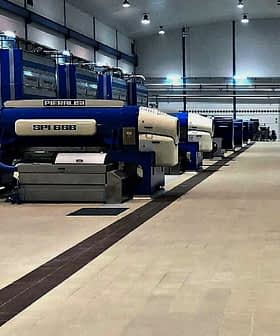
Rambling along California roads and highways to the rhythm of the olive harvest, North America’s only two mobile mills work their way up the coast, making many stops along the way. Just a couple harvests into this very new venture, the demand for mobile milling is almost more than these innovative services can handle. But the operators of Olive 2 Bottle (O2B) and Mill on Wheels (MOW) wouldn’t have it any other way and can’t wait to do it all again.
Mobile mills could not have come at a better time for this booming industry. Of all the factors that contribute to the making of great extra virgin olive oil, from olive variety, to terroir, to irrigation, there’s no denying the importance of getting olives from the tree to the mill as quickly as possible.
“It’s pretty amazing the quality you can get even from mediocre olives by milling them quickly,” said Thom Curry, general manager of Temecula Olive Oil Company, owner of O2B. The reality for many growers and most small growers, who don’t have a mill on their property, or are not close to one, is that time is not always on their side. Loading and hauling tons of olives in what may be rented bins, trucks, and trailers to the nearest mill, is an often expensive and timely endeavor.
The first mobile mill, O2B, according to Curry, was the brainchild of two guys: One quite mechanical with an interest in making the best olive oil, and the other a manager of an equipment company. “It was more of a showpiece than a business,” said Curry, built as a marketing tool to show what could be done. Curry first saw the mill at U.C. Davis in 2009 and was so taken with the idea that he was first in line to purchase it in September 2010, just in time for its second harvest.

Curry quickly got a crew together and jumped into harvest with a healthy base of return O2B customers and no shortage of new ones. “It was a crazy year!” he said, “It was a learning process.” O2B milled between 25 and 30 different places last year and plans on 35 or 40 this year. O2B can mill ¾ of a ton of olives per hour, but Curry keeps it at ½ a ton for better quality.
While O2B was deep into its first harvest, Yves and Clotilde Julien of Olea Farms in Templeton were planning their own mobile mill, an idea that surfaced from their need to mill a lot of trees they planted in San Luis Obispo. Nearby Foxdale Mill is “wonderful,” according to Clotilde Julien, “but it’s small so it can’t produce huge quantities at a time.” They designed Mill On Wheels to take care of that. Marketed as the largest mobile mill in the world, MOW can process two tons of olives per hour. Their goal for their first harvest was to process 100 tons of olives. They exceeded 250. “We could double” that number this year, said Julien, “if the weather permits.” The huge demand prompted talk of adding one more malaxer in a year or two to increase production to 3 – 5 tons per hour.

The mobile mills have been contacted by potential clients in other states and countries as well. MOW has a contract with a customer in Georgia whose harvest should fall in the first few weeks of September. The plan is to ship the 36-foot trailer which houses the mill, and be back in time for California’s harvests. “We’ll start in San Diego and move up through Malibu, the Central Coast and Carmel. That’s our projection,” said Julien. Curry has had interest from growers in Argentina and Australia.
Experienced millers, the priority of the people behind O2B and MOW is to produce the highest quality olive oil. “Our standards are extremely high,” said Julien, “It kills us sometimes, but we don’t care. The olive oil has to be perfect.” Olea Farm and Temecula Olive Oil Company have won many awards for their oils and those they’ve processed for have won best of shows and gold medals. “That’s our reputation,” explained Julien, “We’re going to process as good for everybody as we do for ourselves.”








